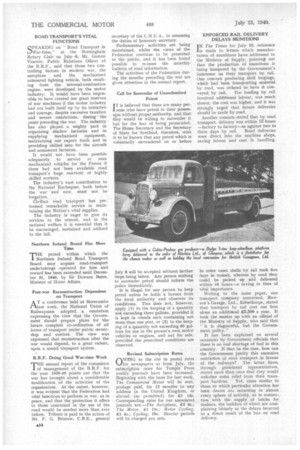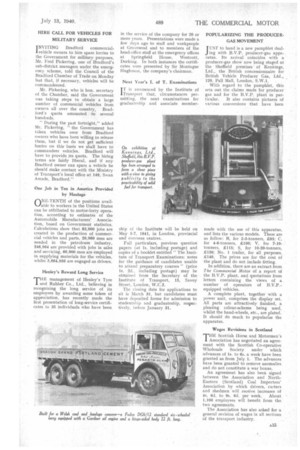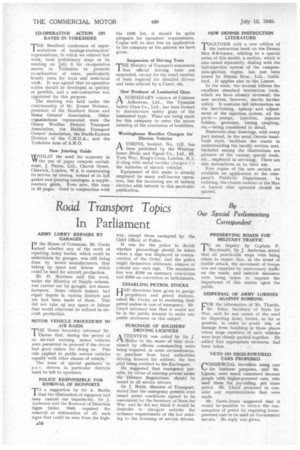ROAD TRANSPORT'S VITAL FUNCTIONS
Page 16

Page 17

Page 18

If you've noticed an error in this article please click here to report it so we can fix it.
SPEAKING on " Road Transport in War-time,' at the Nottingham Rotary Club' on July .8, Mr. Gaston Vincent, Public Relations Officer of the B.R.E., said that those two controlling factors in modern war, the aeroplane and the mechanized armoured fighting vehicle, both resulting from the internal-combustion engine, were developed by the motor industry. It would have been impossible to have created our great reserves of war machines if the motor industry had not built itself up by its initiative and courage, despite excessive taxation and severe restrictions, during the years preceding the war. The industry has also played a mighty part in organizing shadow factories and in supplying mechanized equipment. maintaining our export trade and in providing skilled men for the aircraft and armament factories.
It would not have been possible adequately to service or man mechanized vehicles for the Forces if there had not been available road transport's huge reservoir of highly skilled workers.
The industry's vast contribution to the National Exchequer, both before the war and now, must not be forgotten.
Civilian road transport has performed remarkable service in maintaining the Nation's vital supplies.
The industry is eager to give its services to the utmost, and in the national welfare it is essential that it be encouraged, sustained and utilized to the full.
Northern Ireland Board Has More -rHE period within which the I Northern Ireland Road Transport Board may acquire road-transport undertakings operated for hire and reward has been extended until December 31, 1940, by Sir Dawson Bates, Minister of Home Affairs.
Post-war Reconstruction Dependent on Transport
AT a conference held at Morecambe last week, the National Union of Railwaymen adopted a resolution expressing the view that the Government should prepare plans for the future complete co-ordination of all forms of transport under public ownership and control. The view was expressed that reconstruction after the war would depend, to a great extent, upon a sound transport system.
B.R.F. Doing Good War-time Work
THE annual report of the committee of management of the B.R.F. for the year 1939-40 points out that the war has brought about a considerable modification of the activities of the organization. At the outset, however, it was evident that the Federation had vital functions to perform in war, as in peace, and that the protection it offers to those concerned in the use of the road would be needed more than ever before. Tribute is paid to the action of Mr. F. G. Bristow, C.B.E., general
secretary of the C.M.U.A., in assuming the duties of honorary secretary.
Parliamentary activities are being maintained, whilst the views of the Federation continue to be presented to the public, and it has been found possible to re-issue the monthly bulletin of road information.
The activities of the Federation during the months preceding the war are given attention in the annual report.
I T is believed that there are many per sons who have petrol in their possession without proper authority, and that they would be willing to surrender it but for the fear of being prosecuted. The Home Secretary and the Secretary of State for Scotland, therefore, wish it to be known that any petrol which is voluntarily surrendered on or before
July 8 will be accepted without further steps being taken. Any person wishing to surrender petrol should inform the police immediately.
It is illegal for any person to keep petrol unless he holds a licence from the local authority and observes its conditions. This does not, however, apply (1) to the keeping of a quantity not exceeding three gallons, provided it is kept in vessels each containing not more than one pint, or (2) to the keeping of a quantity not exceeding 60 gallons for use in the person's own motor vehicles or engines, and not for sale, provided the prescribed conditions are observed.
Revised Subscription Rates
OWING to the rise in postal rates for newspapers as from July, the subscription rates for Temple Press weekly journals have been increased. Beginning with the issue for last week, The Commercial Motor will be sent, postage paid, for 12 months to any address in the United Kingdom, or abroad (as permitted) for £1 14s. Corresponding rates for our associated journals are:—The Aeroplane, E2 8s.: The Motor, .£1 15s.; Motor Cycling, Al 4s.; Cycling, 19s. Shorter periods will be charged pro rata.
ENFORCED RAIL DELIVERY DELAYS MUNITIONS
IThe Times for July 10, reference lis made to letters which manufacturers of munitions have addressed to the Ministry of Supply, pointing out that the production of munitions is being hampered by the Government's insistence on their transport by rail. One concern producing shell forgings, which had been transporting material by road, was ordered to have it con
veyed by rail. The loading by rail involved additional labour, was much slower, the cost was higher, and it was strongly urged that future deliveries should be made by road.
Another concern stated that by road transport, delivery was within 12 hours —factory to factory—as against two to
three days by rail. Road deliveries were direct into the machine shops, saving labour and cost in handling.
In some cases shells by rail took five days in transit, whereas by road they could be picked up and delivered within10 hours—a saving in time of vital importance.
Writing to the same paper, one transport company concerned, Rawson's Garage, Ltd., Edenthorpe, stated that transport by rail cost one firm alone an additional R,..3,500 a year. It took the matter up with an official of the Ministry of Supply, who said that " it is disgraceful, but the Government policy."
It has been explained on several occasions by Government officials that there is no real shortage of fuel in this country. If that be the case, how can the Government justify this excessive restriction of road transport in favour of the railways? The latter have, through prominent representatives, stated more than once that they would welcdme some relief from their trans port burdens. Yet, cases similar to those to which particular attention has been drawn ars: occurring in almost every sphere of activity, as in connection with the supply of bricka for shelters, the builders of which are complaining bitterly at the delays incurred as a direct result of the ban on 'road delivery. HIRE CALL FOR VEHICLES FOR MILITARY SERVICE INVITING Bradford commercial"vehicle owners to hire spare lorries to the Government for military purposes, Mr. Fred Pickering, one of Bradford's sub-district managers under the emergency scheme, told the Council of the Bradford Chamber of Trade on Monday last that, if necessary, vehicles will be commandeered.
Mr. Pickering, who is hon. secretary of the Chamber, said the Government was taking steps to obtain a large number of commercial vehicles from owners all over the country. Bradford's quota amounted to several hundreds.
" During the past fortnight," added Mr. Pickering, " the Government has taken vehicles over from Bradford owners who have been willing to release them, but if we do not get sufficient lorries on this basis we shall have to commandeer vehicles, Bradford will have to provide its quota. The hiring terms are fairly liberal, and if any Bradford owner can spare a vehicle he should make contact with the Ministry of Transport's local office at 149, Swan Arcade, Bradford."
One Job in Ten in America Provided by Haulage
ONE-TENTH of the positions available to workers in the United States can be attributed to motor-lorry operation, according to estimates of the Automobile Manufacturers' Association, based on Government statistics. Calculations show that 83,000 jobs are created in the production of commercial vehicles and parts, 20,960 men are needed in the petroleum industry, 246,964 are provided with jobs in sales and servicing, 60,900 men are employed in supplying materials for the vehicles, whilst 3,664,956 are engaged as drivers.
Henley's Reward Long Service 11"HE management of Henley's Tyre and Rubber Co., Ltd., believing in recognizing the long service of its employees by awarding some token of appreciation, has recently made the first presentation of long-service certificates to 35 individuals who have been in the service of the company for 20 or more years. Presentations were made a few days ago to staff and workpeople at Gravesend and to members of the head-office staff at the emergency offices at Springfield house, Westcott, Dorking. In both instances the certificates were presented by Sir Montague Hughman, the company's chairman.
ship of the Institute will be held on May 5-7, 1941, in London, provincial and overseas centres.
Full particulars, previous question papers (at Is. including postage) and copies of a booklet entitled "The Institute of Transport Examinations: notes for the guidance of candidates unable to attend preparatory courses " (price Is. 2d., including postage) may be obtained from the Secretary of the Institute of Transport, 15, Savoy Street, London, W.C.2.
The closing date for applications to sit is larch 31, but candidates must have deposited forms for admission to studentship and graduateship, respectively, before January 31. POPULARIZING THE PRODUCER. GASMOVEMENT UST to hand is a new pamphlet
deal
ing with B.V.P. producer-gas apparatus. Its arrival coincides with a producer-gas show now being staged at the Sheffield premises" of Kennings, Ltd., the British concessionnaire for British Vehicle Producer Gas, Ltd., 120, Pall Mall, London, S.W.I.
With regard to the pamphlet, this sets out the claims made for producer gas and for the B.V.P. plant in par ticular. It also contains pictures of various conversions that have been made with the use of this apparatus, and lists the various models. These are as follow: B, for 2-3-tonners, 2,95; C. for 4-6-tonners, 2100; V, for 7-10tonners, 2115; S, for 10-20-tonners, 2150; No. 1 trailer, for all purposes. £140. The prices are for the cost of the plant and do not include fitting.
In addition, there are an extract from The Commercial Motor of a report oi the B.V.P. plant, and quotations from letters containing the views of a number of operators of B.V.P.equipped vehicles.
A complete plant, together with a power unit, comprises the display set. All parts are attractively finished, a pleasing colour-scheme being used, whilst the hand-wheels, etc., are plated. It should do much to popularize the apparatus.
Wages Revisions in Scotland
THE Scottish Horse and Motormen's Association has negotiated an agreement with the Scottish Co-operative Wholesale Society under which advances of Is. to 6s. a week have been granted as from July 1. The advances have been granted to remove anomalies and do not constitute a war bonus.
An agreement has also beeii signed between the Association and NorthEastern (Scotland) Coal Importers' Association by which drivers, carters and shedmen will receive increases of 4s. 6d, to 9s. 6d. per week. About 1,100 employees will benefit from the two agreements.
The Association has also asked for a general revision of wages in all sections of the transport industry. CO-OPERATIVE ACTION ON RATES IN YORKSHIRE
THE Bradford conference of repre1 sentatives of haulage-contractors' organizations, to which we referred last week, took preliminary steps at its meeting on July 5 for co-operative moves in Yorkshire to promote co-ordination of rates, particularly -hourly rates for local and semi-local work. It was agreed that co-operative action should be developed as quickly as possible, and a sub-committee was appointed for this purpose.
The meeting was held under the chairmanship of Mr. Ernest Webster, president of the Bradford Horse and Motor Owners' Association. Other organizations represented were the heavy Woollen District Transport Association, the Halifax Transport Owners' Association, the North-Eastern Division of the C.M.U.A., and the Yorkshire Area of A.R.O.
New Jointing Guide [11/1-1ILS'T the need for economy in VI' the use of paper compels curtailment, J. Payen, Ltd., Church Street, Chiswick, London, W.4, is maintaining its service by issuing, instead of its full gasket and jointing catalogue, a supplementary guide. Even now, this runs to 32 pages. Used in conjunction with the 1939 list, it should be quite adequate for operators' requirements. Copies will be sent free on application to the company at the address wehave given.
Suspension of Driving Tests
THE Ministry of Transport announces that official driving testsare suspended, except for the small number of tests required for disabled drivers and tests ordered by a. Court, etc.
New Producer of Laminated Glass
ASUBSIDIARY concern of Colmore Adhesives, Ltd., the Tyneside Safety Glass Co., Ltd., has been formed to manufacture safety glass of the laminated type. Plans are being made for this company to enter the motor industry at the conclusion of hostilities.
Westinghouse Rectifier Chargers for Electric Vehicles
A USEFUL booklet, No. 11E, has rt. been published by the Westing.' house Brake and Signal Co., Ltd., 82, York Way, King's Cross, London, NI. thaling with metal rectifier chargers 1-r the batteries of electric vehicles. Equipment of this make is already employed by many well-known operators, but the increasing use of battery electrics adds interest to this particular publication.
NEW DENNIS INSTRUCTION LITERATURE TOGETHER with a new edition of 1 the instruction book on the Dennis Max 6-8-tonner, relating to a special series of this model, a section, which is also issued separately, dealing with the fuel-injection system of the compression-ignition engine, has just been issued by Dennis Bros., Ltd., Guildford. It applies also to the Lancet.
In the main, the manual follows the excellent standard instruction book, which we have already reviewed; the new section, however, merits further notice. It contains full information on the functioning, upkeep and adjustment of the injection system, all the parts — pumps, injectors, injector holders, governor, timing coupling, etc.—being considered in detail.
Numerous clear drawings, with every part named, in the usual Dennis handbook style, facilitate the reader in understanding the lucidly written text. Included among the illustrations are pictures of the various special tools, etc., employed in servicing. There are also instructions as to their use.
Free copies of the new section are available on application to the company's Publicity Department. In ordering, the chassis number of the Max or Lancet oiler operated should be quoted.




















































